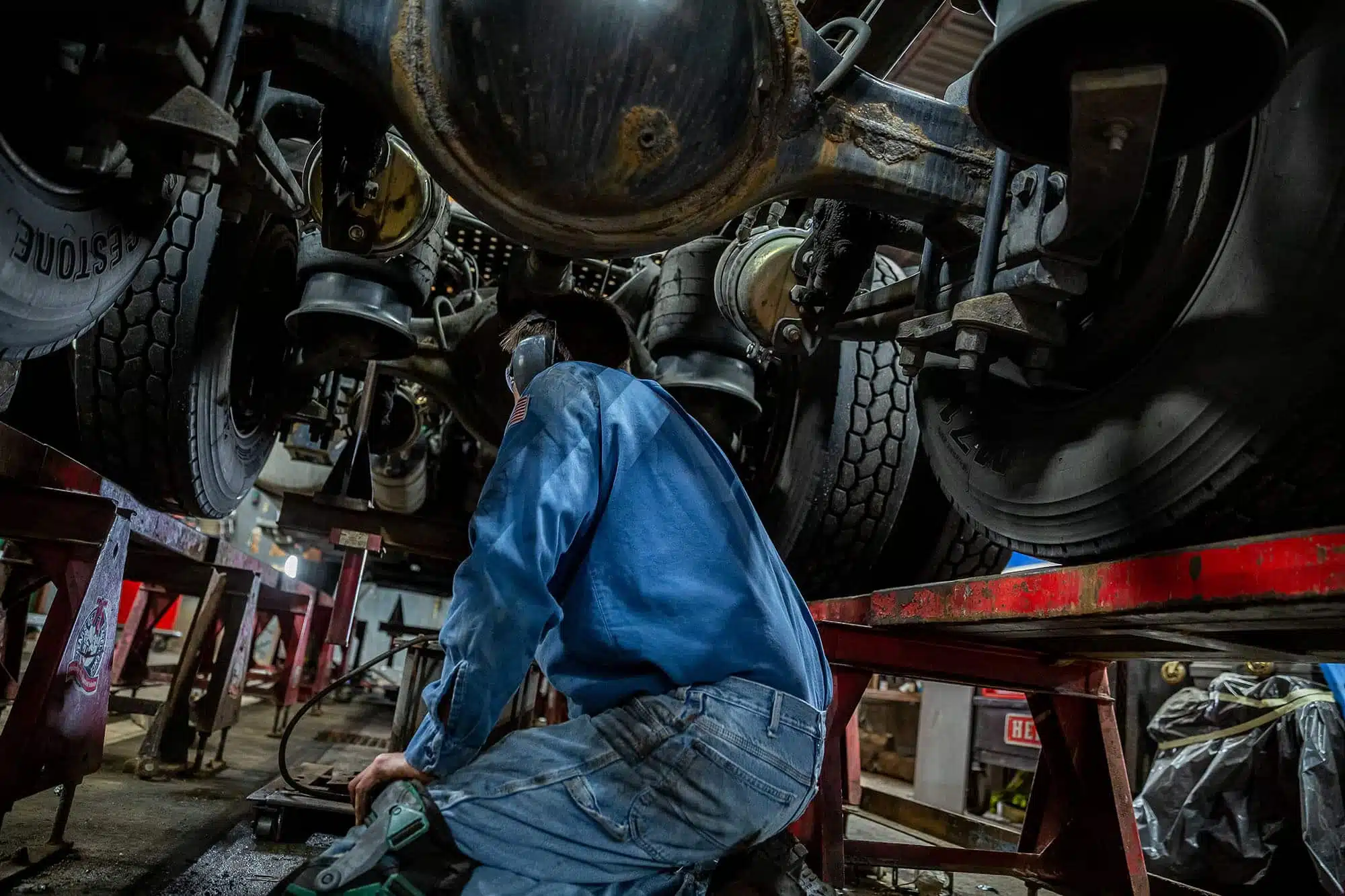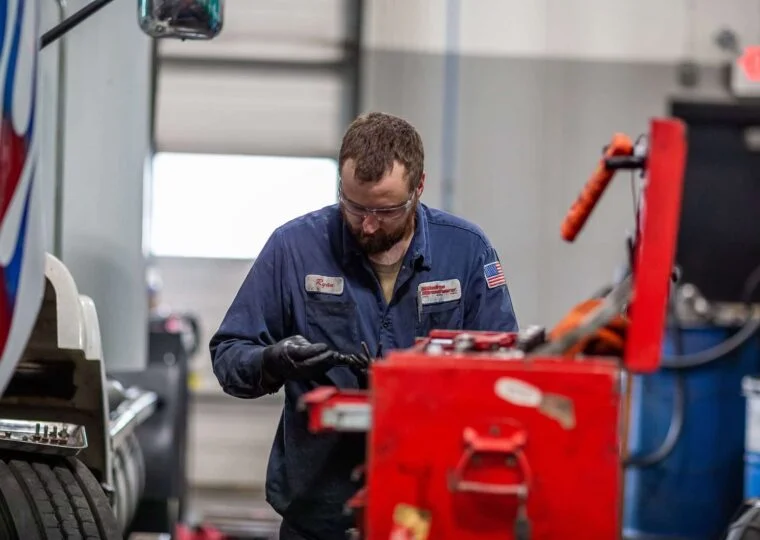Ensuring that semi-trucks are in optimal condition involves maintaining their performance, safety, efficiency, and longevity. While many may consider engine maintenance as the sole priority, the alignment, frame, and suspension of a truck are equally crucial. These components play a pivotal role in how the truck operates, carries its heavy loads, and ensures the safety of its cargo and driver. Let’s take a closer look at these aspects to get a better understanding of their significance.
 Understanding the Basics of Truck Alignment, Frame & Suspension
Understanding the Basics of Truck Alignment, Frame & Suspension
Truck alignment refers to the adjustment of the truck’s wheels and suspension system. Proper alignment ensures that the wheels are perpendicular to the ground and parallel to each other. Alignment plays a vital role in ensuring even tire wear, optimizing fuel efficiency, and offering a smooth driving experience.
The frame is the backbone of a heavy-duty truck. It provides the necessary support for the truck’s components and payload. The strength and integrity of the frame directly influence the truck’s capacity to carry heavy loads without distortion or damage. A compromised frame can not only decrease the truck’s lifespan but can also pose significant safety threats.
The suspension system of a truck is designed to provide a smooth ride by absorbing shocks from bumps and debris in the road. It also ensures that the tires remain in constant contact with the road, providing stability and control. An efficiently functioning suspension system protects the truck, its cargo, and its driver from potential damage and discomfort caused by rough roads.
The Role of Proper Alignment in Truck Safety & Performance
Misalignment in trucks can lead to uneven tire wear, causing them to degrade at an accelerated rate. This compromises the safety of the vehicle and also results in a rough driving experience. Moreover, misalignment can strain the truck’s steering components, making it more challenging to control, especially in adverse weather conditions.
A truck with proper alignment will experience better fuel efficiency. Misaligned tires can create unnecessary resistance and friction, leading to increased fuel consumption. By ensuring that your truck’s wheels are correctly aligned, you can also maximize the lifespan of the tires, saving both fuel and replacement costs.
When a semi-truck’s alignment is off, it can drift or pull to one side, which can be particularly hazardous while driving at high speeds or while navigating turns. Misalignment increases the risk of accidents and jeopardizes the safety of the truck driver, cargo, and other drivers on the road.
Why Maintaining the Truck Frame is Essential
The frame of a heavy-duty truck is instrumental in distributing the weight of the vehicle and its cargo. Any damage or distortion to the frame can lead to an uneven weight distribution, negatively impacting the truck’s balance and stability.
A weakened or damaged frame can result in a cascading effect on the truck’s overall performance. It might strain the suspension system, alter the alignment, and even affect the braking efficiency. Over time, these cumulative effects can lead to increased maintenance costs and decreased safety.
Regular inspections and maintenance of the truck frame can extend the vehicle’s life. Spotting and addressing minor issues early on can prevent more significant problems in the future, ensuring that the truck remains operational for many more miles.
Suspension Maintenance
The suspension system in a heavy-duty truck plays a critical role in its operation, especially when it comes to ride quality and load-bearing. The suspension absorbs shocks from uneven road surfaces, ensuring that the vehicle remains stable even when carrying hefty loads. When in optimal condition, the suspension ensures that the weight of the cargo is evenly distributed across the vehicle, preventing undue strain on specific parts of the truck and safeguarding against potential rollovers.
Just like any other component of a semi-truck, the suspension system can degrade over time. Worn-out shock absorbers, damaged springs, bushing wear, and misaligned components are common culprits behind a deteriorating suspension system. When these components falter, drivers might experience a bouncy or uneven ride, decreased load-carrying capacity, and unusual tire wear patterns.
Diagnosing suspension issues isn’t always straightforward. Many symptoms can be subtle and might be dismissed as minor inconveniences. Regular professional inspections can identify and address these issues before they worsen, ensuring the truck’s longevity, performance consistency, and safety on the road.
Dangers of Neglecting Maintenance
Maintenance isn’t just about keeping the semi-truck running; it’s about extending its life. Regularly overlooking issues or postponing necessary checks can result in long-term damage, reducing the truck’s operational lifespan.
While routine maintenance might seem like an unneeded additional expense, the cost of neglecting it is much higher. Addressing problems when they’re minor is almost always less expensive than dealing with significant breakdowns. Plus, a well-maintained truck consumes less fuel and requires fewer part replacements.
A truck that hasn’t been properly maintained is a hazard on the road. From reduced braking efficiency to compromised load-carrying capacity, the dangers are manifold. Prioritizing regular maintenance ensures the safety of the driver, the cargo, and everyone else on the road.
 How Often is Maintenance Needed?
How Often is Maintenance Needed?
The frequency of maintenance for heavy-duty trucks can greatly influence their performance, safety, and longevity. As a general rule, comprehensive maintenance checks should be scheduled at least every 12,000 miles or once a year, whichever comes first. However, this isn’t a one-size-fits-all answer. Factors such as the type of cargo carried, road conditions frequently encountered, and the specific make and model of the truck can dictate adjustments to this timeline.
Additionally, trucks that operate in harsher conditions, such as extreme temperatures or in mountainous or off-road terrains, might require more frequent inspections. Always consult your manufacturer’s guidelines and stay attuned to any signs of wear, unusual noises, or changes in performance. Regular, proactive maintenance can prevent small issues from escalating into costly repairs or dangerous situations on the road.
Trust Blaine Brothers With Your Truck’s Maintenance
Ensuring the alignment, frame, and suspension of your heavy-duty truck are in top shape guarantees both performance and safety. Every mile driven is an investment in your vehicle’s future. Reach out to Blaine Brothers today if you’d like to schedule a maintenance appointment for your truck at one of our locations in Minnesota or Wisconsin.


 Understanding the Basics of Truck Alignment, Frame & Suspension
Understanding the Basics of Truck Alignment, Frame & Suspension How Often is Maintenance Needed?
How Often is Maintenance Needed?